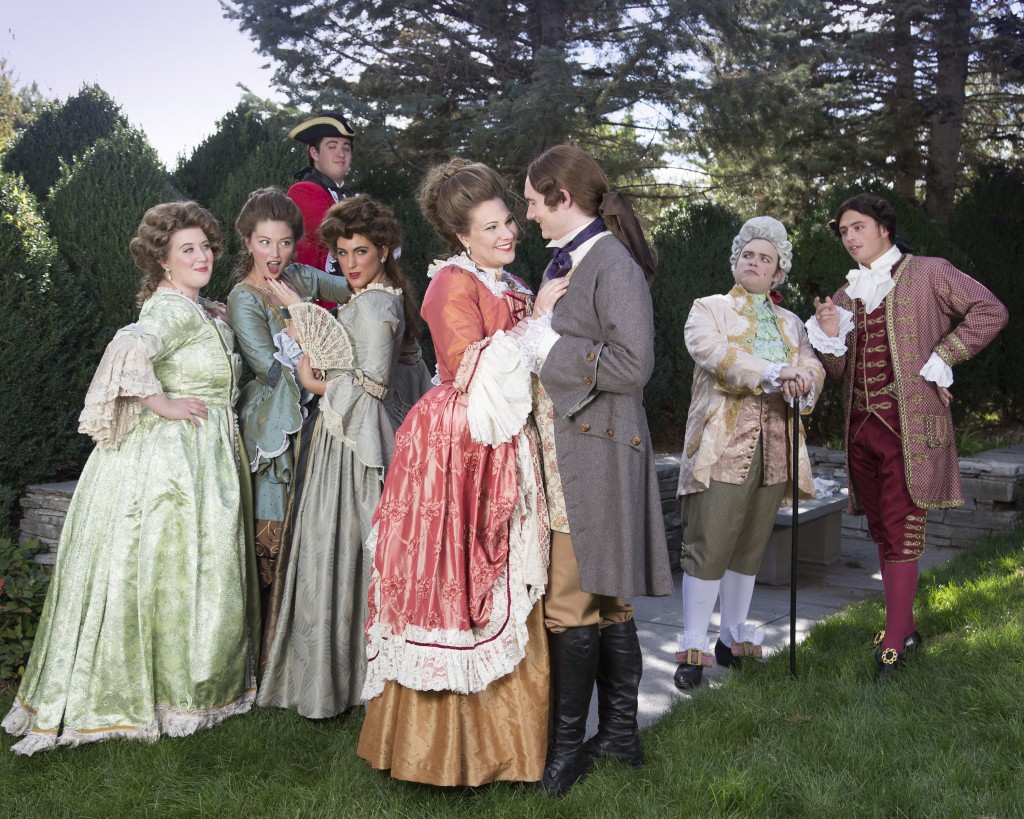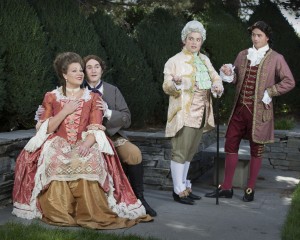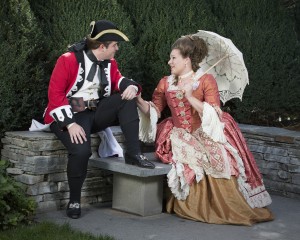
The director and cast of BYU’s first production of Jules Massenet’s “Manon” described opera as a beautiful, unique, challenging and impactful art form that has relevance to modern society.
The show debuted in the de Jong Concert Hall of the Harris Fine Arts Center on Oct. 21-24, 2015 with previews on Oct. 17 and 20. BYU Philharmonic, conducted by Kory Katseanes, provided the music accompaniment. Click here for an article about the show.
The opera told the tragic story of a young Frenchwoman named Manon Lescaut, who chose wealth over the man she loved, des Grieux, which ultimately lead to her death.
Director Lawrence Vincent said “Manon” is a beautiful but challenging opera seldom performed. Vincent has directed and produced operas at BYU for over 18 years. He suggested the opera to the voice faculty. It agreed BYU had students with the voices to perform “Manon.”
Opera is the most demanding entertainment medium, according to Vincent. He explained that an opera production requires complex instrumental playing and vocal ability, collaboration between the cast and orchestra, and all the elements of a stage production – sets, costumes and lighting. The casts’ voices must fill a concert hall without microphones. He said some opera singers are not trained actors like they are trained singers, and therefore must develop their acting skills as they rehearse. The singers must also learn to sing in a foreign language.
Operas at BYU are double-casted because the School of Music does not perform enough operas for all opera singers at BYU to perform in. The two casts for “Manon” alternated each performance. Vincent said directing a double-casted show has pros and cons.
“The strongest advantage is giving more people chance to participate,” Vincent said. “Next advantage is if someone becomes ill, have someone to cover that performance. A disadvantage is it takes more time to block and rehearse two casts.”
He explained seeing an opera often costs a lot of money because so much goes into it. Vincent mentioned BYU students are lucky to have the opportunity to see quality opera shows at a low price. Elisabeth Coleman, a vocal performance graduate student and one of the singers who played the lead role, said opera often comes with a negative connotation. She said people expect high pitched, drawn-out singing but do not realize how much passion and emotion operas have.
Vincent said people get out of opera what they put into it.
“It’s a medium that you can’t go to observe like you can to a movie or sit down and watch TV,” Vincent said. “You have to do a little bit of research: watching clips from YouTube, reading about the opera. You do that and then when you hear it live it speaks to you.”

Ben Bird and Dru Daniels, who played des Greaux and Manon, did not originally plan to study opera when they came to BYU. Now they both plan on pursuing a career in opera after graduating with an MA in vocal performance.
Daniels, a second year grad student, said she wanted to do musical theatre, but got recruited into opera.
“I’d never seen an opera. I came here and was like, ‘Opera? What’s that?’ I thought I hated classical music; now I love it. The music of this opera is probably my favorite of any show I’ve ever done,” Daniels said. “Before, I thought, ‘Yeah, it’s nice.’ Now that I’ve delved into every note, it’s so beautiful and powerful to me.”
Bird, a second year graduate student who got his bachelor’s in linguistics, said he took singing lessons to get into BYU Singers. He continued taking voice lessons after getting accepted into the touring choir and was introduced to opera.
“I didn’t become passionate about opera until I started learning about it,” Bird said. “It’s changed my whole life.”
He mentioned he feels blessed to be able to study opera since he is currently the only vocal performance graduate student without a music undergraduate degree.
Vincent explained he tries to tie in a spiritual lesson with each opera he directs here at BYU. The character, Manon, builds her dreams on the beauties and wealth of 18th century France at the sacrifice of love. This and the bad choices of the other characters cause pain, heartache and misery for all. Vincent said he hopes students will learn to stay true to what they know is right and not let the world lure them off course.
Ka’imi Ruberson, the other singer who played des Grieux, explained the other characters in “Manon” prove wanting anything too much leads to negative consequences.

In the show, Manon convinces des Grieux to gamble so they will be rich. Gambling in France at that time was illegal according to Ruberson. He said his character does not want to be there in the saloon at all, but he puts his values aside to make Manon happy because he loves her so much. Manon’s cousin, Lescaut, is addicted to gambling in the performance. An older man named Guillot fancies Manon and becomes so jealous that he accuses des Grieux of cheating and has him and Manon arrested. Ruberson explained he thinks people should learn from theses characters’ mistakes.
Coleman said Manon gains redemption at the end when she realizes the error of her ways.
“If Manon had lived, she would have tried to change,” Coleman said.
She said she wants to become a professional opera singer after she graduates in April. She mentioned she is currently working on putting the gospel first in everything she does.
“It’s not easy in the profession I want to pursue,” Coleman said. “I believe that as long as we put the gospel before everything then our lives will turn out exactly the way they’re supposed to.”




